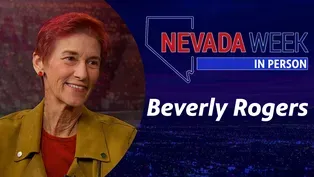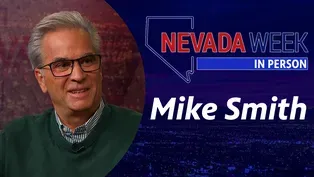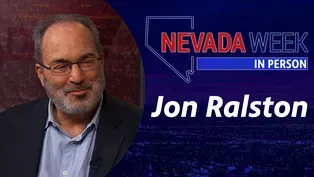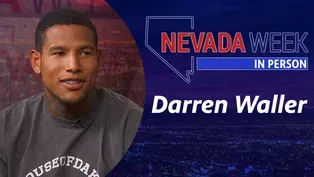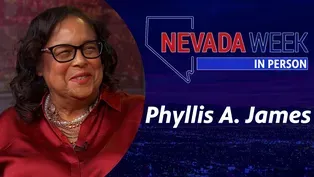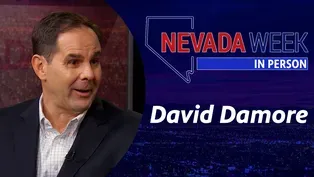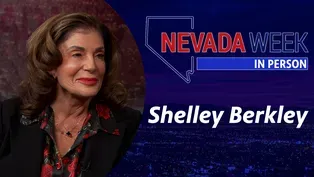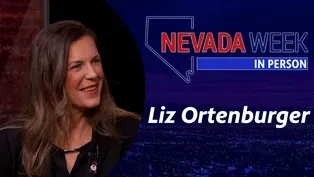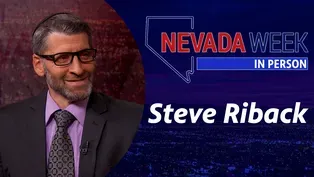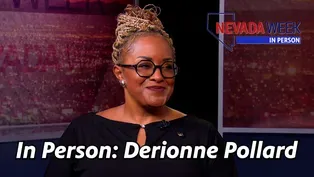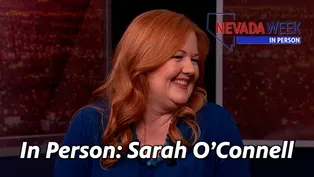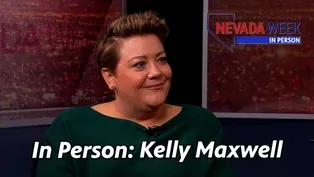
Nevada Week In Person | M.J. Ivy
Season 1 Episode 28 | 14mVideo has Closed Captions
One-on-one interview with Pastor M.J. Ivy.
One-on-one interview with Pastor M.J. Ivy.
Problems with Closed Captions? Closed Captioning Feedback
Problems with Closed Captions? Closed Captioning Feedback
Nevada Week In Person is a local public television program presented by Vegas PBS

Nevada Week In Person | M.J. Ivy
Season 1 Episode 28 | 14mVideo has Closed Captions
One-on-one interview with Pastor M.J. Ivy.
Problems with Closed Captions? Closed Captioning Feedback
How to Watch Nevada Week In Person
Nevada Week In Person is available to stream on pbs.org and the free PBS App, available on iPhone, Apple TV, Android TV, Android smartphones, Amazon Fire TV, Amazon Fire Tablet, Roku, Samsung Smart TV, and Vizio.
Providing Support for PBS.org
Learn Moreabout PBS online sponsorshipMore from This Collection
Nevada Week In Person | Beverly Rogers
Video has Closed Captions
One-on-one interview with Rogers Foundation chair Beverly Rogers. (14m)
Nevada Week In Person | Mike Smith
Video has Closed Captions
One-on-one interview with Las Vegas Sun political cartoonist Mike Smith. (14m)
Nevada Week In Person | Jon Ralston
Video has Closed Captions
One-on-one interview with The Nevada Independent CEO Jon Ralston. (14m)
Nevada Week In Person | Darren Waller
Video has Closed Captions
One-on-one interview with Las Vegas Raider tight end Darren Waller. (14m)
Nevada Week In Person | Phyllis A. James
Video has Closed Captions
One-on-one interview Phyllis A. James. (14m)
Nevada Week In Person | David Damore
Video has Closed Captions
One-on-one interview with Chair of the Department of Political Science at UNLV David Damor (14m)
Nevada Week In Person | Shelley Berkley
Video has Closed Captions
One-on-one interview Senior Vice President for Touro University Shelley Berkley. (14m)
Nevada Week In Person | Liz Ortenburger
Video has Closed Captions
One-on-one interview with SafeNest CEO Liz Ortenburger. (14m)
Nevada Week In Person | Steve Riback
Video has Closed Captions
One-on-one interview with Las Vegas Metro Police Lieutenant Steve Riback. (14m)
Nevada Week In Person | DeRionne Pollard
Video has Closed Captions
One-on-one interview Nevada State College President DeRionne Pollard. (14m)
Nevada Week In Person | Sarah O’Connell
Video has Closed Captions
One-on-one interview with Director of Eat More Art LLC Sarah O’Connell. (14m)
Nevada Week In Person | Kelly Maxwell
Video has Closed Captions
One-on-one interview with Baby’s Bounty Executive Director Kelly Maxwell. (14m)
Providing Support for PBS.org
Learn Moreabout PBS online sponsorshipA U.S. Air Force veteran, a longtime local referee and a faith-based leader often seen speaking up at Clark County School District board meetings.
Pastor M.J. Ivy joins us this week for Nevada Week In Person.
♪♪♪ Support for Nevada Week In Person is provided by Senator William H. Hernstadt and additional supporting sponsors.
Welcome to Nevada Week In Person; I'm Amber Renee Dixon.
Pastor M.J. Ivy leads Kinship Community Church in Las Vegas and strives to improve the lives of Southern Nevada youth through several unique roles, including as an athletics official.
Pastor, thank you for joining us.
-Thank you.
-We're going to get to that role with the Southern Nevada Officials Association in a bit, but I want to start with your roots in the church.
Raised in St. Louis, Missouri to parents Deacon Jacob and Barbara Ivy, do you get your religious fervor from your father?
(Pastor M.J. Ivy) I get it from my grandparents and my great-grandparents.
It's been a long history.
My parents, Deacon Jacob and Barbara Ivy, "mom and dad" affectionately known, have been married 58 years next month, so being dedicated is what they've taught me to the community and to the family.
And when you see that-- and by the way, family is not just people that are blood related.
It's other folks in your community.
And when I saw that, my brother and I saw that, it has shaped us to be where we're at today.
-Does it tend to be a family thing?
-Oh, all the time.
I surprised mom, went to Phoenix the other day just for Mother's Day so I can surprise her and tell her how much, you know, I love her.
And my brother and I are not in the same space all the time, so she was very happy to see both her sons together on Mother's Day.
-Well, what I meant more by that question is if someone becomes a pastor, is it typical that they have family members prior to them?
-Oh, man, everyone is family.
Your cousins are not just your cousins they're your brothers and sisters.
Your longtime friends that have been in the church are not just friends, they're your brothers and sisters.
So when I speak of family, I speak of everyone that has an impact in my life and hopefully I have in theirs.
-You graduated from high school, tried college a couple of years, had not so much success academically initially, so then you went into the military, the U.S. Air Force and served in the first Gulf War.
How did you reconcile war with your religious beliefs?
-Oh, very easily.
My father served in Vietnam as well and had the same thing, and it was just prayer.
Because where they classify where to put you, I don't want to take a human life but I will defend this country, and there was no doubt about that.
But the Air Force, you know, they always like to kid us that we push a lot of buttons and we do, but we're just very smart at what we do.
The military in itself is the greatest in the world.
I do not regret one day, one minute of serving in the United States Air Force out of Sheppard Air Force Base in Wichita Falls, Texas and proud to do it and would do it again if I could, I promise you.
-What do you mean by the Air Force pushes buttons?
-Well, you know, we always kid about our Army and Marine buddies and the Navy, and they kid about us that we're really not part of the military, we just know how to push buttons, and I say well, you got to be smart enough to know how to push the right button is we tease about.
But we all-- what I love about veterans and all of us, let danger walk through the door, and you'll see all of us stop kidding and we form one tight unit.
That is the point of leadership, that is the point of working together even when you have differences.
When there's a mission to accomplish, veterans know how to get it done.
-Did you have a leadership role when you were serving in the Gulf War?
-I had a leadership role from day one when I walked in-- I was a dorm chief and I was actually a part of the band so I had men and women in 1992.
That was my first leadership role, to have 75 men and women under my command.
So that was a great honor.
It taught me a lot.
I laughed through it a lot more because I was 20 years old and trying to lead people.
But we were all young, and we were all trying to find our spaces, and when you can be an inspiration to somebody who's two or three years younger than you or someone that's the same age and you find camaraderie, you find friendship, and you find brotherhood and sisterhood, and it was important to me.
So I've worked with men and women for a very long time even before basketball.
-So you combine that leadership role with the communications degree that you would go on to get.
You have your own communications company now.
You combine those two, that seems to make a good pastor to me.
But in your opinion, what do you think makes a good pastor?
-Bottom line, you got to love people, and love is an action word and not just spoken.
We have a number of people that speak a lot of things but don't put it in action.
So while the pandemic was going, our church was the first to-- and I think the only-- to put volunteers out.
We volunteered to drive people to get their shots.
We volunteered to make sure people got to their appointments.
We set up their appointments so they can get tested for COVID.
We did that by faith, and we were featured on another news channel only because we were in the street, and people knew about it and saw our Facebook to say hey, you're trying to make a difference.
Yes we are, because we don't believe when bad things happen, good people should step back in the shadows.
Good people step up even when there's darkness.
We are the light in that darkness, and we want to be.
-At a time when people were pulling back from volunteering to protect their own health and safety, you were actually out in the streets.
You deal with Southern Nevada's young people both directly and indirectly, the direct method being as a referee.
How did you start with that, and what are your experiences like?
-In 1994 I became a basketball referee, just walked into-- I was asked to come to a meeting, and because I played high school and college they felt yes, you probably would be good, and I'm glad for that encouragement.
Now, that has taught me leadership and it's taught me time management, it's taught me to deal with people in a very stressful situation and to remain cool.
-Youth sports is stressful?
-Oh, my goodness.
You know, we're at a time right now where referees of every sport are pulled back.
People have retired, people have said I don't want to deal with this.
They're not getting enough pay for what they have been dealing with, and you really have to do it for love for the game, love for the kids.
And yes, it's 28 years I've been doing this.
I'm the former vice president of the Southern Nevada Officials Association.
I've officiated every level except the Olympics, and I have no desire to go to the Olympics, I promise you.
I just love officiating the game because it brought me so much joy.
It brought me so much opportunity across this country.
I've officiated from Portland to Florida, or Seattle to Florida down that way and then from New York to San Diego, all criss-crossed through this country, and people are good.
Everyone is a good person.
We have bad apples, but you learn how to deal with everything in 28 years.
Fights on the floor, people who will spit on you, people who will want to push you, but you have to remain steadfast and immovable and always abounding, and you will find success, I promise you.
-What's it like dealing with the parents versus the children?
-Children are always easy to me, because I look like somebody's dad, you know, and my dad was no punk.
(laughter) So you just look like, you know, hey, you better calm down and relax.
Parents, I have to remind them that this is a uniform and I'm a parent too, and I have no dog in the fight.
I'm not going to cheat your kid.
But they're kids.
Let's let them have fun, let's let them enjoy themselves and let them learn some lessons in life that will help them down the road.
If we become helicopter parents, then we're not allowing them to make the mistakes that help them grow and develop personalities and the wherewithal to make it through life.
-And when I mentioned the more indirect work that you do with children and teens, it's through the Clark County School District, sitting on several important task forces, most recently the Anti-racism Inclusion and Diversity Task Force that was created last year.
This year you came out with a policy that was approved and is being utilized.
What was the need for that?
What was your contribution?
-Well, the need for it is the growing disparity of African American kids and Hispanic kids in that order being disciplined on a much substantial rate than white children, and it's gotten a lot of attention.
We're asking why, and it's not just in one area of town.
It's all over our district, and it's very disturbing.
So when people call me and ask me, when teachers, the safety issues that we're talking about now, we've been talking about them for a while so we want to make sure as a faith leader, we need to be at the table of solutions.
I honestly believe that.
It's a part of my soul, that we bring a pause sometimes if we're speaking right, if we're speaking to the heart of the matter and we're speaking for the youth and we're speaking for teachers and administrators to make sure we see both sides.
Officiating makes you see both sides.
Officiating makes you stay right in the middle.
You have to look at the rules, you have to look at the law, the policy that's in, and then you have to dispense what's right on both sides.
And when you have kids, and I've watched them.
Those same youth are on the basketball court, those same youth are on the golf course, the same youth are on football and soccer fields, they're the same kids.
When you have issues and troubles, we have to speak to the heart of what's going on, and a lot of it is domestic violence at home, not having access to the computers the way they need to finish their homework, not having people that really honestly care, not in talk but again in deed.
And when you have that-- and lastly, kids are hungry.
Not just for knowledge, but physically hungry, and when you have kids that their only meal is going to be at the school it's a struggle, and we have to take pause, really realize a baby doesn't cry just because it wants to annoy you.
It cries either because it's hungry, it's in pain or it just doesn't want to go to sleep, and because of that, you have to figure out one of those three, sometimes four things.
But they're not crying just to annoy you.
You have to take the time to listen and understand, and when you do, I promise you those kids really want to listen.
They want to be disciplined, but they want to be disciplined in a positive way, in the right way that they can see something for themselves in the future.
-Some of the solutions perhaps to school violence, what would you suggest?
-As I said before the school district, we have 87% in this country of teachers are women.
We have now pushed men out of the way, and I'm all for all women's rights, but I have to be all for men's rights too, and anything that's in excess is not good.
So when you have more people that are doing things in the sense that okay, if I have too much jelly and not enough peanut butter, it's not a peanut butter and jelly sandwich.
It's my favorite thing.
But when we have a balance of men and women, when those young people see a balance, when they see a guy like me that loves on them, that cares about them but puts something in his voice that says stop, that bass, it makes kids pause.
We've seen it on the court.
We've seen in other areas of sports because they have to listen, and sometimes it does take a dad.
It does take a man to say hey, stop.
This is wrong.
Hey, I expect better of you.
Let us change our language.
Let us make sure we're communicating and stop taking things personally, because they're crying out because something else is wrong with them, and we've got to do a better job of listening-- not hearing, but listening.
-And not just men, but men of color as well.
-Listen.
Men of color have been exed out of this school district.
We're the fifth-largest school district in the United States, and we have less than 5% African American men in the school district.
That's not good.
We don't have men on the upper level.
Dr. Sam Scavella, who is over equity and diversity, is the highest person that's there.
So we have got to have more men, African American, Hispanic and Asian men, men of color, men of cultural descent in our school district.
-Pastor M.J. Ivy, thank you so much for joining us on Nevada Week In Person.
To see this week's edition of Nevada Week, tune in on Sunday night at 5:30, Tuesday night at 7:30 or anytime you wish at vegaspbs.org/nevadaweek.
It's also where you can find this interview and many more from Nevada Week In Person.
Thanks for watching.
♪♪♪
Support for PBS provided by:
Nevada Week In Person is a local public television program presented by Vegas PBS
